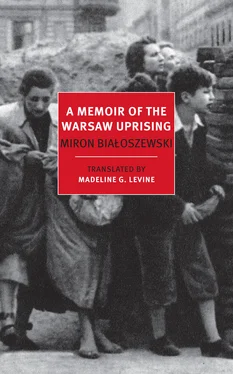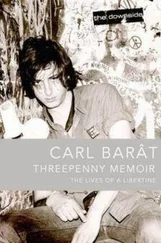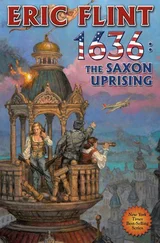Miron Bialoszewski - A Memoir of the Warsaw Uprising
Здесь есть возможность читать онлайн «Miron Bialoszewski - A Memoir of the Warsaw Uprising» весь текст электронной книги совершенно бесплатно (целиком полную версию без сокращений). В некоторых случаях можно слушать аудио, скачать через торрент в формате fb2 и присутствует краткое содержание. Год выпуска: 2015, Издательство: NYRB Classics, Жанр: Биографии и Мемуары, на английском языке. Описание произведения, (предисловие) а так же отзывы посетителей доступны на портале библиотеки ЛибКат.
- Название:A Memoir of the Warsaw Uprising
- Автор:
- Издательство:NYRB Classics
- Жанр:
- Год:2015
- ISBN:нет данных
- Рейтинг книги:4 / 5. Голосов: 1
-
Избранное:Добавить в избранное
- Отзывы:
-
Ваша оценка:
- 80
- 1
- 2
- 3
- 4
- 5
A Memoir of the Warsaw Uprising: краткое содержание, описание и аннотация
Предлагаем к чтению аннотацию, описание, краткое содержание или предисловие (зависит от того, что написал сам автор книги «A Memoir of the Warsaw Uprising»). Если вы не нашли необходимую информацию о книге — напишите в комментариях, мы постараемся отыскать её.
A Memoir of the Warsaw Uprising — читать онлайн бесплатно полную книгу (весь текст) целиком
Ниже представлен текст книги, разбитый по страницам. Система сохранения места последней прочитанной страницы, позволяет с удобством читать онлайн бесплатно книгу «A Memoir of the Warsaw Uprising», без необходимости каждый раз заново искать на чём Вы остановились. Поставьте закладку, и сможете в любой момент перейти на страницу, на которой закончили чтение.
Интервал:
Закладка:
So, Father brought over the chairs after he brought over Stefa. Two Jewish matters. Which went their separate ways for a short while. And then met again.
In 1943, I think, we held one of our so-called “soirées” in the building where the chairs had been auctioned, or perhaps in the one directly across from it, at any rate, in that appendix to Żelazna— Swen, Halina, Irena, Staszek, and I. In the apartment of whoever it was who lived there. A patriotic-literary soirée, with theatrical performances; Swen performed, he was playing Nick at the time, and I, having practically the rights of an extra according to him, played the king. Out of timidity, woodenness, I sat stiffly the whole time and spoke the same way. My colleague in the secret university, Wojtek, who also perished in the uprising, in Żoliborz, said that he’d really enjoyed it. I told him why I acted that way.
“It doesn’t matter; it was very nice.”
I remember that we performed an excerpt from Wyspiański’s The Wedding there. Swen played Stańczyk, wearing the national flag, which he’d carelessly brought over either in his briefcase or in a little bundle.[3]
In his own way, Father had the most unusual business projects. Once, he dragged a whole bushel of potatoes from Kercelak to Leszno Street, to the fourth floor, at that. Rotten. Frozen. But even so they were priceless. Nanka, Father, Mama, and Sabina remembered from the last war that you could make potato pancakes from such frozen potatoes. They made them and they were good. Another time Father bought an icebox at an auction. Mama and Stefa kept wondering why. Because it was broken. And once, he arrived at Chłodna with a whole coatful of fish, very tiny ones. Just like that. In the skirt of his coat. They were slipping out all over the place. He told Mama that she should make croquettes from them. She did. There were so many of them! Enough to line all the windowsills. And we had four windows then. Once, on Christmas Eve of ’42 or ’43, the door opened and in walked Father carrying a Christmas tree — a skinny pine. Mama was astounded. So was I. Father acted as if it were perfectly natural. We ought to begin decorating it. I got started. It was strange hanging the decorations on those pine branches. In general, a pine isn’t a tree, if you ask me. It was like decorating a pine in Otwock. It had nothing in common with a Christmas tree, or so it seemed to me then. An entirely different species. None of the fragrance. Nor the prickliness.
Among Father’s many ideas was that of profiting from the dead, one example of which I’ve already given. But there were more. We received marmalade, bread, and various other foods on the basis of ration cards in the names of about four deceased persons. Relatives, of course. But such things were done in those days. What wasn’t done then?
It’s time to explain the case of Stefa. Stefa would have lived with us until the end. But one day in the spring of 1944 I came back from the city and Mama (she sewed dresses for women so that she and I would have something to live on, or rather, she re-remade them, because these were clothes made from already remade clothing, so-called fripperies, and if a woman wanted to combine a coat with fur, she used rabbit fur; they knew it would shed like cats in springtime, but what could they do)… Anyway, Mama, who sewed for our custodian, too, told me at the door, “You can’t imagine how deathly frightened I was today. The janitress shows up for that rag of hers and she says to me, ‘That lady who’s your boarder, well, when she walks across the yard she twists her head like this and walks sort of sideways; oy, you can tell from a mile away that she’s a Jewess.’ ”
So Stefa had to move. As it turned out, the janitress hadn’t made that remark from malice, but who could tell. We had to assume the cat was out of the bag, as they say. Anyway, one warm day, in May I think, after Stefa had moved out, I woke up at six a.m. and could hear a real commotion. Downstairs. Right away, I had a funny feeling. I rushed over to the window in my nightshirt. In front of every stairwell there was a German with a rifle. And they were going through all the stairwells and checking everyone. No one knew why. In our apartment, at least, it didn’t go any further than a check of identity cards, my Ausweis , and then they left. A German and a Polish-speaking informer wearing a white coat. Maybe nothing would have happened. To Stefa. If she’d still been there. Perhaps she would have passed as Zosia Romanowska. But who knows who that guy in the white coat was.
Well, on August 5, 1944, Stefa was sitting there in that chair, the post-Jewish one, with which she had been reunited, a turban on her head, because turbans and wooden shoes were fashionable out of necessity throughout Europe, it seems, but for some reason you could recognize German women in particular by those turbans and Stefa, after all, was pretending to be German.
So, Stefa was sitting in that chair and saying, “Where haven’t I been. I’m riding in a tram. A commotion. I look at my basket. And then someone throws me an armband. A Jewish one. They stop the tram, take us to Gęsiówka. We’re there, the partisans rescue us, we run through Krasiński Gardens, across Bielańska Street, and then through the Saxon Gardens; but the Germans are there, so we double back; Żelazna Brama, people on their knees, they’re going to shoot them, I’m telling you, Miron, it’s a miracle we escaped.”
“But you made it back here?”
“Ach, what it was like…”
Aunt Józia was there, too, right away. Her house—49 Ogrodowa Street — adjoined ours at 4 °Chłodna. Its third courtyard (the rear wall) had a hole in it and that was the passageway into our long courtyard. I was happy that there were more of us. Though, to be honest, Aunt Józia returned to her house. But Stefa stayed on; it wasn’t gloomy. And also, she’d survived. But suddenly, after various setbacks and news bulletins, such disastrous deterioration and such hell set in, that one lost interest in everything. The attack against Chłodna, against Ogrodowa, was in progress. People were shot to death, burned on pyres on Górczewska Street, on Bem, on Młynarska, on Wolska. Those who were stubbornly (I am amazed at how stubbornly) defending the lines of the Polish front kept finding the stairways, exits, everything cut off; they lay on roofs, on the fifth and sixth floors; the roofs caught fire, burned through, and the men caved in along with the roofs. An inferno, as in the ghetto during Easter of 1943.
Excavating, digging out, extinguishing fires, helping — it was difficult, although it was done, but it was made impossible by new bombs falling all the time, incendiaries. Or rather, it was hopeless. A vicious circle. At someone’s cry, “Planes!” we rush to a cellar, a shallow basement housing a workshop for glass tubes and balls. A crush. Panic. Prayer. Explosions. The rumbling, bursting of bombs. Groans and fear. Again they fly low. An explosion, they’re probably bombing the front, we crouch down. Nearby an old neighbor beats her breast, “Sacred heart of Jesus, have mercy on us…”
The howling of planes, bombs.
“Sacred heart…”
And suddenly something rocks our house. Window frames, doors, glass panes are blown out. Explosions. The end? Still more crashes. Even more explosions. We go outside for a while. The yard is changed, it’s black, covered with dust, gone gray, the windows are empty, the panes smashed to smithereens. In front of the gate is a crater half the length of the street. We look out from our second-floor window. At that scene. Crowds in the courtyard. Hell — nothing less — and without end. It’s bad. The crowds panic. With packages, bundles. They run. Some toward the gate. Others, away from the gate. Some through the hole toward Ogrodowa Street. Others toward us from Ogrodowa Street. Suddenly, an uproar. A horrifying scream. A kind of humming from the crowd. They’re carrying something. Someone… They put it down. Corpses? A scream… Whose?
Читать дальшеИнтервал:
Закладка:
Похожие книги на «A Memoir of the Warsaw Uprising»
Представляем Вашему вниманию похожие книги на «A Memoir of the Warsaw Uprising» списком для выбора. Мы отобрали схожую по названию и смыслу литературу в надежде предоставить читателям больше вариантов отыскать новые, интересные, ещё непрочитанные произведения.
Обсуждение, отзывы о книге «A Memoir of the Warsaw Uprising» и просто собственные мнения читателей. Оставьте ваши комментарии, напишите, что Вы думаете о произведении, его смысле или главных героях. Укажите что конкретно понравилось, а что нет, и почему Вы так считаете.












